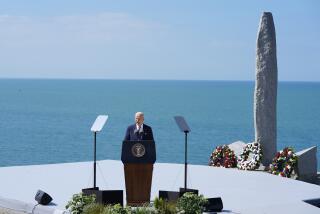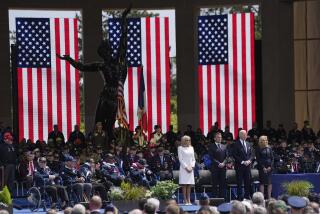The Historic Result of a Monumental Blunder : D-day was made inevitable when Hitler declared war on the United States
- Share via
There had been nothing like it before, and there would be nothing like it ever again.
The armada that 50 years ago today filled the English Channel from Britain’s southern ports to the northern coast of France was made up of 5,333 ships and boats, more, the historian Samuel Eliot Morison would write, “than there were in all the world when Elizabeth I was Queen of England.” Within a 24-hour period starting at first light on June 6, 1944, those vessels would land 175,000 men and 50,000 vehicles on the beaches of Normandy. By the end of that first day nearly 5,000 of the American, British and Canadian troops in the invasion force would be casualties, among them paratroopers who had gone in hours before the first landing craft reached the beaches.
“With our brave allies and brothers-in-arms on other fronts, you will bring about the destruction of the German war machine,” the supreme Allied commander, Gen. Dwight D. Eisenhower, told his troops that morning. “You will bring about . . . the elimination of Nazi tyranny. . . . “ It was a precise order. Eleven months later it would be fulfilled.
D-day, 1944, had been made inevitable 30 months earlier when Adolf Hitler made the monumental strategic blunder of declaring war on the United States. Once fully involved in the European war, the United States quickly agreed with its British and Soviet allies that defeating Germany would take precedence over the war against Japan. Once it was committed, the United States could mobilize the full potential of its industrial power for the global struggle.
In 1939, as Stephen E. Ambrose notes in his fine account, “D-Day,” Depression-struck U.S. factories were still producing at only half their capacity and unemployment still stood at 20%. Four years later factory capacity had expanded many times over and U.S. assembly lines were turning out a mind-boggling 8,000 planes a month , along with thousands of trucks and tanks and millions of other weapons.
But in the end victory would depend not just on materiel but on the steadfastness of Allied fighting men. The liberation of Europe could come only when the German army was driven out of the countries it had begun occupying in 1939 and then was destroyed as an effective force on its home soil. It would come only when Germany was squeezed between Western armies driving across France and Belgium and the Red Army of the Soviet Union thrusting from the east, where war was waged with particular ferocity. (As Gerhard L. Weinberg writes in “A World at Arms,” more people were killed on the eastern front--most of them civilians--than on all the rest of the world’s fronts combined.) And it was the success of Operation Overlord, the opening of the long-awaited second front in Normandy, that assured the eventual victory.
That battle, in all its terror and confusion, is massively and vividly documented, from the level of supreme commander down to the infantry private. To read what the men who went ashore faced and suffered and triumphed over--and thousands of hours of oral history provide graphic witness to what it was all about--is at once stirring and horrifying. All wars are cruel and wasteful, all battles are brutal, all victories exact a fearsome price. The price exacted that day on French beaches code-named Utah, Omaha, Gold, Juno and Sword, and the price that would have to be paid in the months ahead, was high. But what was achieved in crushing Nazi despotism was beyond value.
A few days after the Normandy landing the great war correspondent Ernie Pyle began a column with these words: “ . . . I want to tell you what the opening of the second front entailed, so that you can know and appreciate and forever be humbly grateful to those both dead and alive who did it for you.” A half-century later, as the anniversary of that feat of arms is honored, gratitude and respect and humility in recalling the courage and sacrifice of that day continue to be compelled.
More to Read
Sign up for Essential California
The most important California stories and recommendations in your inbox every morning.
You may occasionally receive promotional content from the Los Angeles Times.










